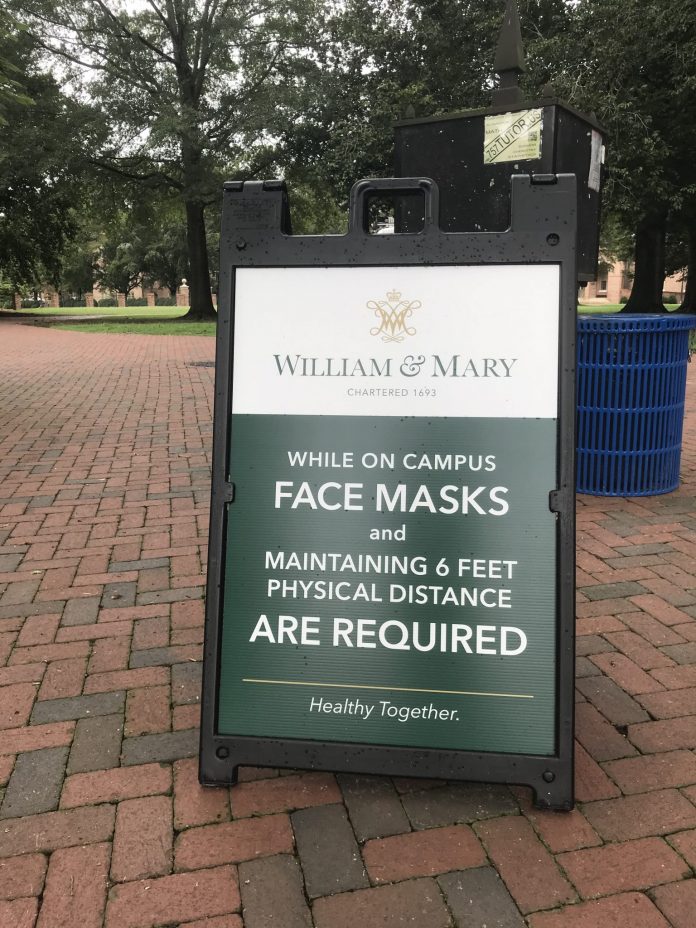Starting Wednesday, Aug. 12, incoming members of the College of William and Mary’s class of 2024 will move into their freshman residence halls and begin orientation amidst severe restrictions adopted in response to COVID-19. As the College attempts to create a community of wellness and health in the coming semester, students, faculty and staff face significant alterations to their lives on campus.
Following a July 31 update from College President Katherine Rowe, fall semester classes will commence online Wednesday, Aug. 19, with in-person classes scheduled to start taking place in early September. In addition to delaying in person classes, Rowe postponed plans for most students to return to campus, with only resident assistants, orientation aides, international students and incoming freshmen permitted to move in as previously scheduled.
According to College spokesperson Suzanne Clavet, the university is aiming for a Labor Day move-in for returning students, but that deadline is dependent on conditions at the College and in Williamsburg.
“University leadership in consultation with the COVID Response Team and William & Mary’s Public Health Advisory Committee will continue to look at a number of factors in making the decision on when returning students should arrive on campus including the rate of infection on campus, in the community and regionally; how well the community is complying with facial covering, physical distancing and healthy behavior guidelines; test turnaround times, hospital bed capacity, isolation and quarantine capacity, etc,” Clavet said in an email. Our current plan is for that return to occur over Labor Day weekend.”
Before students returned to campus, the College established a mandatory testing program, which required all students to complete a COVID-19 self-examination. Sponsored through the College’s new partnership with VCU Health, testing has been conducted through Kallaco, a medical services conglomerate.
Students have had mixed experiences with Kalloco, which the College originally pledged would provide students’ test results within 36 hours of receiving their self-examination kits. Neha Sharma ‘22, who will return to campus early as an OA, received her test Thursday, Aug. 6, less than a day after she provided her address using Kalloco’s test ordering software.
“I literally put my name and address into the system ordering a test yesterday, and it got here this morning before 10:30 a.m. for me,” Sharma said in a written statement. “But also I live in Northern VA so that might be playing a role.”
Other students have had worse testing experiences. Madeleine Walker ‘21, another OA, had not received her test by Aug. 6, more than two weeks after she requested it from Kalloco, making her concerned that she could not participate in orientation activities starting Monday, Aug. 10.
“… it is very stressful because I don’t know how I can be an OA if I don’t get tested.”
“… it is very stressful because I don’t know how I can be an OA if I don’t get tested,” Walker said in a written statement.
Friday, Aug. 7, Vice President for Finance and Administration Sam Jones ’75, M.B.A ’80 clarified in a community notice that receiving test results from Kalloco may take up to 72 hours, instead of the original 36 hours suggested.
After its initial testing regimen, the College also plans to conduct COVID-19 prevalence testing, sampling five percent of students and staff every two weeks. The College’s prevalence testing plans pale in comparison to recommendations issued by a recent study conducted by the Yale School of Public Health which urged universities to test students every two days to effectively control COVID-19 spread.
Fall semester academics have also been altered in response to COVID-19, with students pursuing six unique modes of in-person and online instruction. Nineteen percent of classes possess traditional face-to-face and synchronous attributes, whereas 59 percent are taking place entirely online, with varying degrees of synchronization.
Clavet said that the spring semester’s more lenient interim grading policies, which permitted students greater flexibility in taking pass/fail courses for credit, are not currently in effect for the fall 2020 semester. However, she indicated that unanticipated campus developments may result in a revisiting of those policies.
“The fall semester will begin under the university’s traditional 4 pt. grading system,” Clavet said. “If any additional adjustments are necessary to the structure of the fall semester, the Provost will review whether any changes to the grading system are warranted.”

